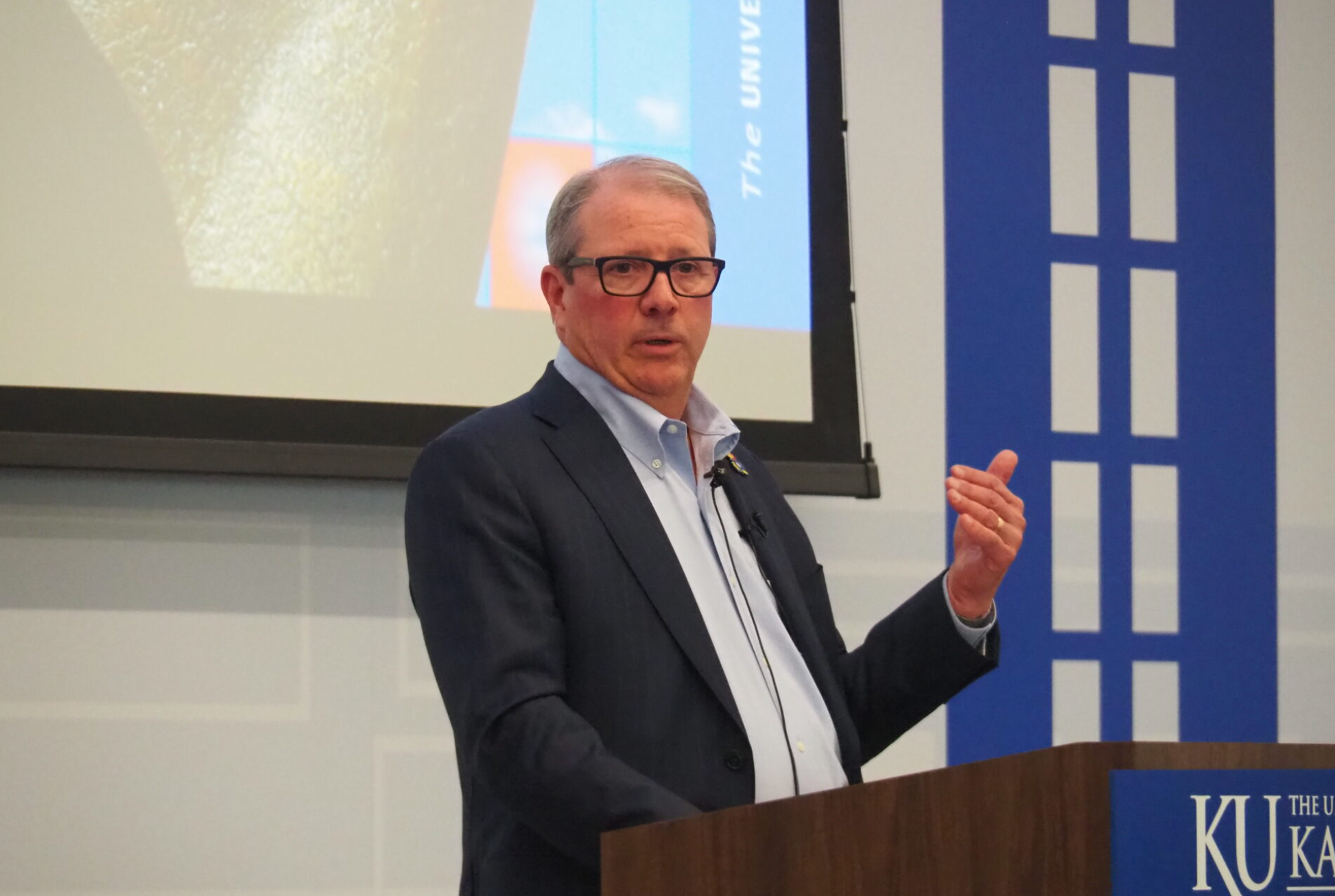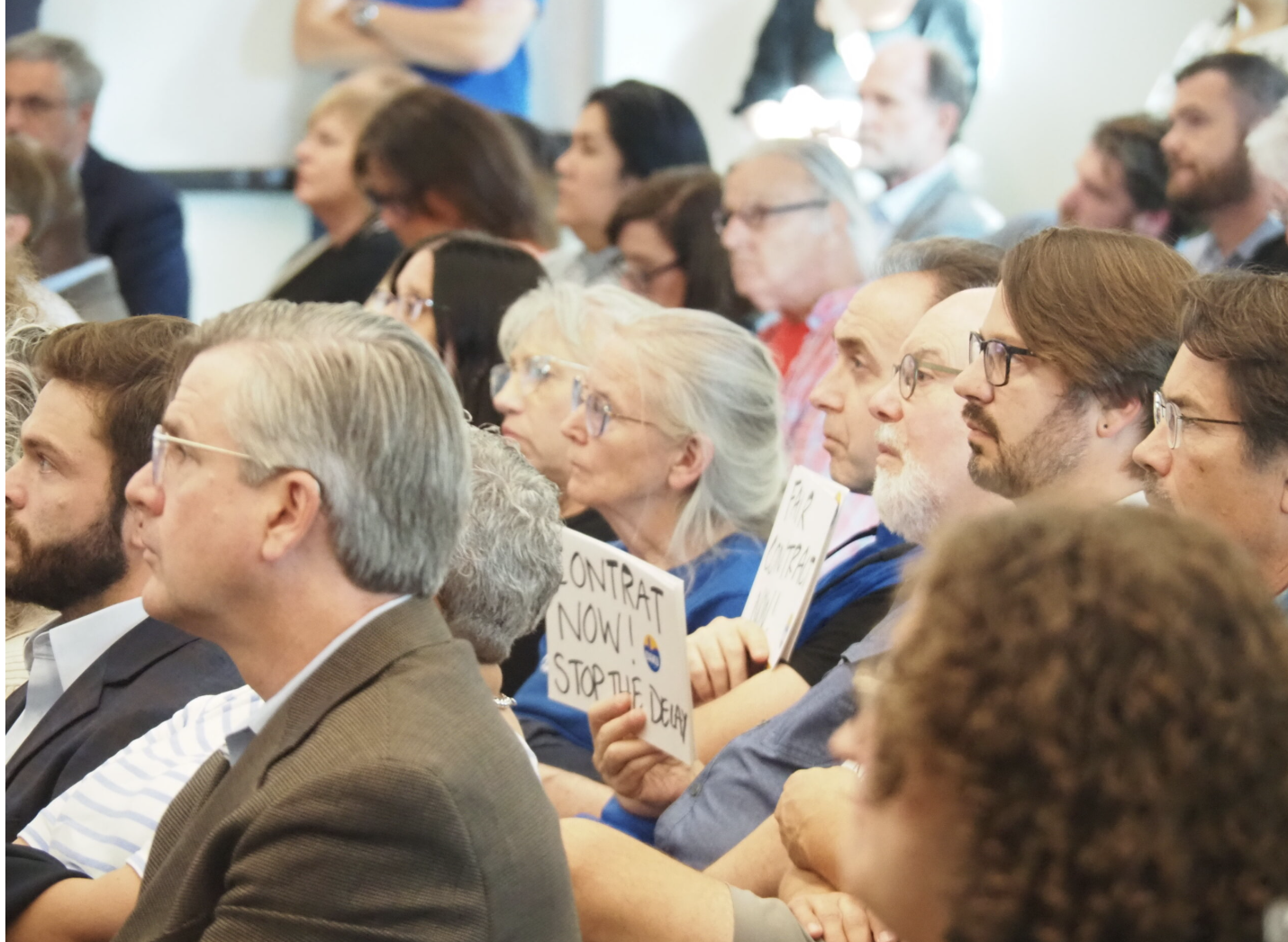
Federal, state funding uncertainty looms; anti-tenure bill to resurface in Topeka
By TIM CARPENTER
Kansas Reflector
University of Kansas chancellor Doug Girod explores KU’s achievements in student recruiting, faculty research and endowment fundraising on Oct. 17, 2025, in a campus speech. Girod, chancellor since 2017, pointed to a series of threats confronting U.S. higher education. (Photo by Tim Carpenter/Kansas Reflector)
LAWRENCE — University of Kansas chancellor Doug Girod says dismantling of federal funding of university research, lukewarm state budgets, a precipitous drop in college-age students, rise of artificial intelligence and inflationary pressure on operating costs threaten the future of higher education.
These headwinds exist amid dwindling enthusiasm, regardless of political affiliation, in the public’s view of the value of investment in a college degree, the chancellor said. Positive sentiment among Americans for higher education has eroded from 70% to 40% in less than a decade, he said.
“The question of, is the investment worth it, is really the question that’s being asked a lot of our society,” Girod said. “It’s creating a time of fairly significant uncertainty across the country right now.”
Girod said computing power of artificial intelligence would transform KU and other higher education institutions. AI must be viewed as a “disruptor,” he said, but also an opportunity to evolve.
“It’s going to completely change how we educate. It’s going to completely change how we conduct research. It certainly is going to completely change how we conduct our business of higher education,” he said.
Girod shared the report Thursday during his annual “State of the University Address,” which featured a broad analysis of U.S. higher education as well as distinct challenges facing KU and a summary of the university’s enrollment, research and fundraising trends.

Positive trends
Girod said KU this fall achieved record student enrollment for the second consecutive year. The current freshman class at KU is the third largest in university history, he said. At the same time, the chancellor said, KU improved student retention and its graduation rate. The decline in 18-year-olds in the United States will make continuation of that track record increasingly difficult, he said.
“We have the most Kansas kids we’ve ever had. We have the most out-of-state kids we’ve ever had. That’s a great place to be at this moment in time,” he said.
The chancellor said KU documented nine consecutive years of growth in research funding as the total climbed from $337 million in 2017 to $611 million in 2024. The pipeline of research grants in the current year has “slowed down profoundly” as the administration of President Donald Trump rolled back federal research and development funding available to colleges and universities.
He said progress has been made with the “One KU” project to realign and unify administrative leadership of KU campuses in Lawrence, Wichita and Kansas City, Kansas. The idea is to create efficiencies by moving away from a decentralized campus-based administrative structure, he said.
“The goal of that is obviously to help us streamline and be far more strategic, but also far more nimble in leveraging our assets across all our campuses,” Girod said.
Girod told about 200 people during the speech that KU endowment’s fundraising campaign eclipsed the $2 billion mark with two years remaining in a 10-year quest to secure commitments of $2.5 billion. He said half the contributions were destined for KU’s Lawrence campus, 30% would be dedicated to KUMC and 20% was earmarked for athletics.
“I’m happy to stand up here and say the state of our university is actually quite strong,” Girod said. “Probably the strongest it’s ever been. I also know I say that in a moment when we probably have the highest degree of uncertainty that we’ve had … in the history of the university.”
Kansas headwinds
Girod said the 2025 Kansas Legislature adopted a flat budget in terms of base support for KU, which could be viewed as a step backward due to inflation. He said a 30% surge in operating costs in the past five years and combined challenges with state and federal funding prompted decisions to cut spending by $32 million on the Lawrence campus and to reduce spending by $39 million on the KU Medical Center campus in Kansas City, Kansas.
“I’ll tell you on the Lawrence campus about half of that cut will go to market pay for faculty and staff, but that really just gets us started on that journey,” Girod said.
David Smith, a professor of sociology, was among faculty and staff in the audience holding small signs during the chancellor’s speech that said “Contract now! Stop the delay” or “Fair contract now!” KU faculty and academic staff in April 2024 approved formation of a union by capturing 86% of the vote among nearly 1,000 participants in the election. The bargaining unit, United Academics of KU, represents employees with educational or research roles on campus.
“We have been in contract negotiations for well over a year now,” Smith said. “It’s been something like 450 days since those contract negotiations began.”
Smith said union negotiators were working to improve compensation, especially for adjunct faculty or people on short-term contracts. He said negotiations included an effort to enshrine in the first contract guarantees the administration formally shared governance with faculty and staff. For example, he said, faculty and staff should have had a role alongside KU administrators in deciding whether to discontinue 42 academic programs in 2022.
Girod said the 2026 session of the Legislature would be important to KU, and early indications were that it would be another tight budget year for higher education. He anticipated legislators would renew a push to redefine university tenure so it no longer could be recognized as an “entitlement, right or property interest.” The 2025 version of that legislation was blocked by opponents, including Girod, from emerging from a House committee.
“We’ve already been told its coming back again. We know that’s something we’re going to have to pay attention to because it’s so critical to what we do and who we are as an institution,” the chancellor said.





